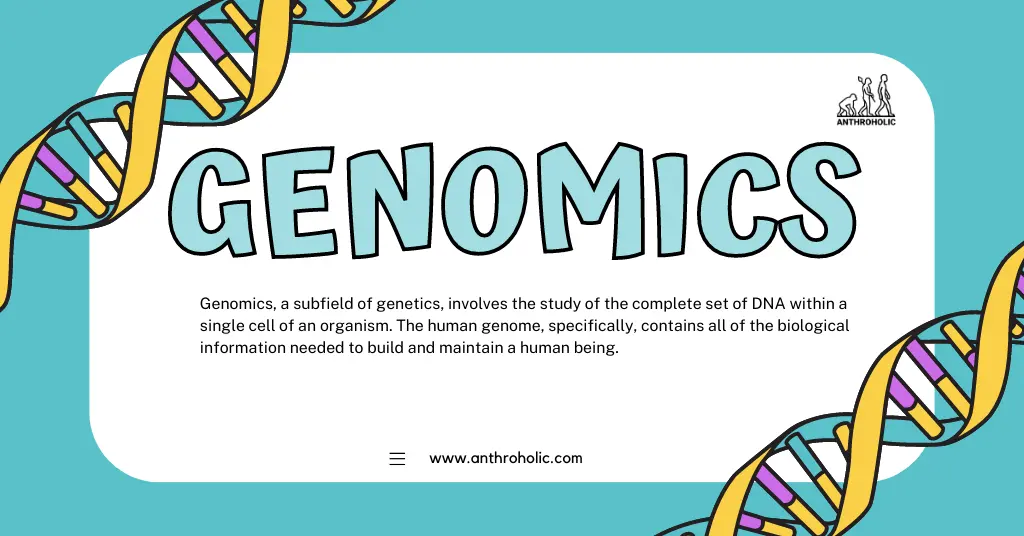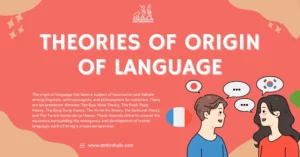AI Answer Evaluation Platform Live Now. Try Free Answer Evaluation Now
Genomics
Genomics, a subfield of genetics, involves the study of the complete set of DNA within a single cell of an organism. The human genome, specifically, contains all of the biological information needed to build and maintain a human being. Composed of approximately 3 billion base pairs, it is the blueprint of human life, providing an intricate understanding of how genes interact with each other and their environment. From a simple bacterium to a complex human, the genome encapsulates the essential instructions required for the development, growth, function, and reproduction of a species.

Since the completion of the Human Genome Project in 2003, the field has experienced monumental advancements. Technologies such as next-generation sequencing have greatly reduced the cost and time required for genomic sequencing, opening up the possibility of large-scale genomic studies and personalized medicine.
Relevance of Genomics in Anthropology
Anthropology, the comprehensive study of humans across times and spaces, is inherently interdisciplinary and has found valuable insights within genomics. Genomic anthropology, or anthropological genomics, is a branch of anthropology that explores the relationship between our genetic makeup and our cultural, biological, and social traits. It employs genomic data to investigate human history, evolution, and diversity.
Genomics provides an unprecedented view into our species’ past, revealing the patterns of migration, interbreeding with archaic hominins, adaptation to diverse environments, and even aspects of social behavior. It has played a significant role in redefining our understanding of human origins and differentiation. Moreover, genomics helps anthropologists to understand how biological and cultural forces have shaped human genetic variation and how this variation influences human health and disease patterns.
Historical Background
The intersection of genomics and anthropology has roots dating back to the 1960s and 1970s, when molecular anthropology began to evolve. Researchers started examining genetic variations using protein polymorphisms, blood groups, and later, mitochondrial DNA and Y-chromosome markers [1].
The completion of the Human Genome Project in 2003 marked a significant milestone for anthropologists. The project not only decoded the entire human genome, but also established a database of human genetic variation called HapMap, providing critical resources for anthropological research [2].
The Evolution of Genomics in Anthropology
With the advent of next-generation sequencing technologies, the scale and scope of genomic studies have dramatically increased. Anthropologists are now able to analyse complete genomes from modern and ancient individuals, providing a much more nuanced understanding of human history and biology.
Ancient DNA research, in particular, has revolutionized the study of human evolution, migration, and adaptation. It has resolved debates about the relationship between modern humans and Neanderthals, and has traced the spread of farming and languages across continents [3].
Genomics and Human Evolution
Tracing Human Migration Patterns through Genomic Data
As the study of genomics advances, it continues to provide vital insights into the intricate pathways of human migration throughout history. By comparing variations in the genomes of diverse modern populations, researchers can infer ancestral relationships and migration routes, painting a detailed picture of human migration that was once out of reach.
For instance, one significant revelation from genomic data supports the coastal migration theory. This theory suggests that modern humans spread from Africa along the southern coast of Asia and into Australia about 50,000 years ago. This hypothesis was corroborated by genomic studies which found unique genetic markers in contemporary Aboriginal Australians, tracing their lineage back to the first wave of human migration out of Africa.
Similarly, genomic studies of Native American populations have illuminated the timing and sources of their ancient migrations. These studies indicate that Native Americans are descendants of a single ancestral group that migrated from Asia over a land bridge, known as Beringia, more than 15,000 years ago.
Genetic Diversity and the Out of Africa Theory
The Out of Africa theory, suggesting all modern humans originated from a single population in Africa about 200,000 years ago, has found substantial support in genomic data. Genetic studies have shown that the amount of genetic diversity decreases with distance from Africa, consistent with sequential founder effects during our species’ expansion.
Additionally, genome sequencing has confirmed interbreeding between modern humans and archaic hominins, such as Neanderthals and Denisovans. For example, non-African humans carry a small proportion of Neanderthal DNA, implying interbreeding events occurred after the migration of modern humans out of Africa.
Role of Genomics in Understanding Human Adaptations
Genomics has proven instrumental in understanding human adaptation to different environments, a crucial aspect of human evolution. By comparing genomes from various human populations, researchers have identified genetic variants associated with adaptations to specific environmental challenges.
For instance, one landmark study identified a genetic mutation in the Tibetan population associated with adaptation to high altitude. This mutation, found in the EPAS1 gene, helps Tibetans live in low-oxygen conditions without developing health issues like hypoxia, commonly experienced by people living at high altitudes [4].
Another significant discovery is the genetic adaptation to lactose digestion in adults. While lactose intolerance is common in many populations, some groups, particularly those with a historical reliance on dairy farming, have a high prevalence of lactose tolerance. Genomic studies identified a mutation associated with lactose tolerance, offering a clear example of gene-culture co-evolution.
Ethical Considerations in Genomic Anthropology
Privacy Concerns in Genomic Studies
The revolution in genomic technology has raised critical concerns regarding privacy. As genetic data can reveal intimate details about an individual’s susceptibility to disease, personal traits, and ancestral origins, its handling requires the utmost care. In the case of unauthorized access or data breaches, sensitive information might be exploited leading to various forms of discrimination and stigmatization. Furthermore, genetic data’s inherently identifiable nature raises questions about the anonymity and confidentiality traditionally promised in research contexts. Therefore, genomic researchers need to adopt stringent data protection measures to maintain participants’ trust and willingness to participate in genomic studies.
Ethical Dilemmas in the Use of Genomic Data
The vast amount of data generated by genomic studies introduces a multitude of ethical dilemmas. One of these concerns is the risk of genetic discrimination. There’s a fear that employers or insurance companies might misuse genomic information to discriminate against individuals based on their genetic predispositions.
In addition to this, the issue of incidental findings has stirred a heated debate within the scientific community. These are unexpected discoveries that were beyond the initial aim of a genomic test but might have significant health implications. The ethical challenge arises when deciding whether, how, and when these findings should be reported back to the participant, especially when the implications of these findings are not fully understood.
Informed Consent and the Right to Genomic Information
Informed consent in the context of genomic research is a complex issue. The broad scope and long-term nature of genomic research make it challenging for participants to fully comprehend the extent of their involvement when they provide their consent. Furthermore, there is an ongoing debate about participants’ right to access their own genomic data. While it’s essential to respect individuals’ autonomy, there are concerns about the potential harm from misunderstanding or misinterpreting complex genomic information without proper counseling.
The Future of Genomic Anthropology
Emerging Trends in Genomic Anthropology
- Genomic anthropology is a rapidly evolving field, shaped by the simultaneous advances in genomics, computational biology, and anthropological research.
- As the cost of whole-genome sequencing continues to drop, genomic data is becoming increasingly accessible and comprehensive, leading to an explosion of information available for analysis.
- One emerging trend in the field is the integration of genomics with other types of data to provide a richer understanding of human history.
- For example, researchers are beginning to combine genomic data with archaeological, linguistic, and environmental data to unravel the complexities of human migration, adaptation, and cultural change.
- Another promising trend is the rise of ancient DNA (aDNA) studies.
- These studies have unearthed new findings about human evolution, migration, and adaptation by analyzing DNA from ancient human remains.
- This approach has provided unprecedented insights into human history, revealing details that are often not preserved in the archaeological record.
Potential Applications of Genomics in Anthropology
The applications of genomics in anthropology are broad and far-reaching, with implications for our understanding of human biology, history, culture, and society.
In health, genomics can help elucidate the genetic basis of disease, shedding light on why certain populations are more susceptible to specific conditions than others. By understanding these genetic predispositions, we can develop more personalized and effective treatment strategies.
In the study of human history, genomics can help trace ancient migration paths, uncover interbreeding events between modern and archaic humans, and reveal how humans have adapted to different environments over time. This can help fill gaps in the archaeological record and provide a more nuanced understanding of human evolution.
Conclusion
Summary of Key Points
- Throughout the history of humankind, we have sought to understand who we are and where we come from.
- Genomic anthropology has significantly contributed to answering these existential queries by deciphering the complex relationships between our genetic makeup, evolution, cultural and biological diversity, and societal constructs.
- Historically, the confluence of genomics and anthropology revolutionized our understanding of human evolution and migration patterns.
- Genomic data reinforced the “Out of Africa” theory and illuminated the complexities of human migration across the globe.
- This information has deepened our understanding of genetic diversity and the subtle interplay between genetics and the environment in human adaptations.
- Ethical considerations have become increasingly prominent as genomics advances.
- Issues surrounding privacy, potential misuse of genomic data, and the complexities of informed consent have called for thoughtful regulation and discussion within and beyond the academic community.
- Balancing the potential insights offered by genomic data against the ethical responsibilities to research participants is a crucial challenge.
Future Prospects for Genomic Anthropology
Looking forward, genomic anthropology holds immense potential for deepening our understanding of human biology, history, and culture. The ongoing development of genomic technologies will provide even more comprehensive and diverse data. This, coupled with computational advancements, will enable anthropologists to dive deeper into our genetic past and present.
Moreover, the integration of genomic data with archaeological, environmental, and linguistic data offers a more holistic view of human history. This integrative approach is poised to provide nuanced insights into the forces that have shaped and continue to shape our species.
Genomic anthropology also has practical implications. It offers potential health applications, shedding light on how our genetic adaptations to past environments may influence disease susceptibility today. Furthermore, it could illuminate social and cultural phenomena, like historical interactions between populations, reflected in our genomes.
In conclusion, genomic anthropology is a vibrant and rapidly advancing field that is set to redefine our understanding of the human experience. Its potential applications and implications span the domains of health, history, culture, and society. As we continue to unlock the secrets of the human genome, we open the doors to understanding our past and present and, perhaps, glimpsing our future.
References
[1] Cavalli-Sforza, L. L., & Feldman, M. W. (2003). The application of molecular genetic approaches to the study of human evolution. Nature Genetics, 33, 266–275.
[2] International Human Genome Sequencing Consortium. (2004). Finishing the euchromatic sequence of the human genome. Nature, 431(7011), 931–945.
[3] Reich, D. (2018). Who We Are and How We Got Here: Ancient DNA and the New Science of the Human Past. Oxford University Press. https://canvas.brown.edu/courses/1075911/files/61589515/download?wrap=1
[4] Yi, X., et al. (2010). Sequencing of 50 human exomes reveals adaptation to high altitude. Science, 329(5987), 75–78.




